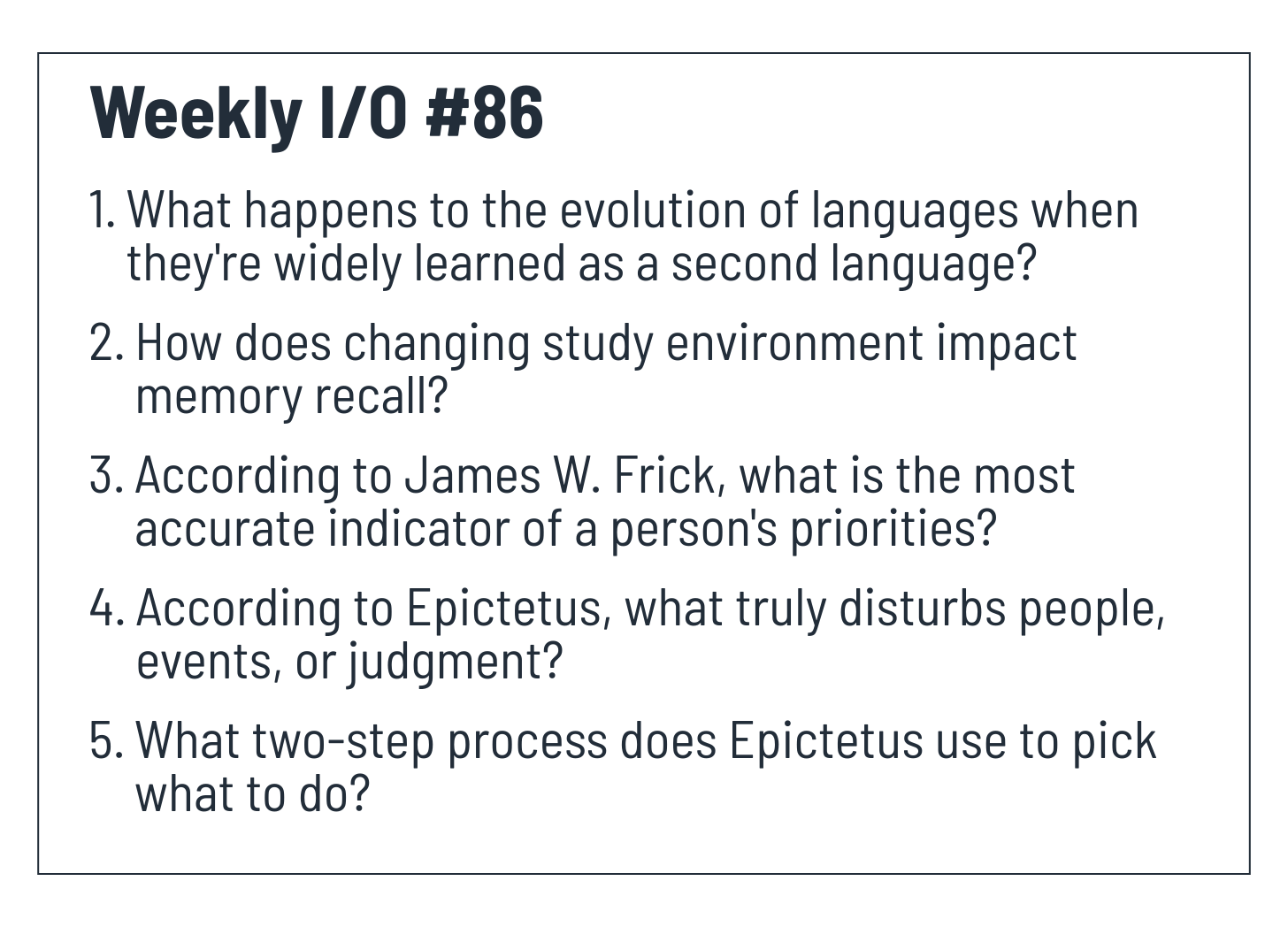Weekly I/O: How second language learners make the language simpler, How changing study environments helps remember, Don’t tell me your priority
#86: Language Evolution and Second Language, Environmental Context and Memory, True Priorities and Money, Event or Judgment Disturb, Say and Do
Hi friends,
Greetings from San Francisco!
Here's your weekly dose of I/O. I hope you enjoy it!
Input
Here's a list of what I'm exploring and pondering on this week.
1. Languages naturally evolve to be more complex in isolation but tend to simplify when more people learn it as a second language because of the cognitive constraint of adult learners.
Podcast: John McWhorter on Linguistics, Music, and Race (Ep. 89 - Live at Mason) | Conversations with Tyler
The evolution of a language is greatly impacted by the number of people learning it as a second language. When a language is spoken by a relatively small, isolated community, it tends to accumulate complex features because there's limited external pressure to simplify.
For example, Estonian is a complex language with 16 cases and numerous dialects and subdialects because very few people learn it as a second language.
On the other hand, when more people learn the language as a second language, it usually becomes simpler. That's why Finnish, which is a sister language to Estonian, is simpler because it has more speakers and learners.
Adult learners are the main driving factors behind the simplification of language because they often find it more challenging to master complex grammatical rules and irregularities compared to kids who learn them as their native language. This cognitive constraint, therefore, forces a gradual simplification of the language as it spreads to a broader population.
2. Changing study environments can significantly improve how well you remember information because environmental context is critical for memory formation.
Paper: Environmental context and human memory
A 1978 study by psychologists Smith, Glenberg, and Bjork found an interesting connection between environment and memory retention. One of their experiments shows that reviewing a study material in two different locations led to a 40% improvement in memory recall compared to reviewing twice in the same place. In other words, simply changing where you study dramatically improves how well you remember information.
This environmental context effect can also be applied to teaching and testing. There are research studies exploring the use of different learning environments, like classroom vs. clinical space, for medical education to enhance retention and having exams in varied contexts to help more flexible retrieval of learned information.
You can also read this meta-analysis paper to learn more about environmental context-dependent memory.
3. “Don’t tell me where your priorities are. Show me where you spend your money and I’ll tell you what they are.” – James W. Frick
Quote
I often think of the variant of this quote: Don't trust what we say about our priorities until we see where and how we spend our time.
Keep a log of how we actually spend time. Pay attention to what we spend time on and whom we spend time with. It can be astonishing how misaligned the way we spend time is with what we set as our priorities.
4. “It isn't events themselves that disturb people, but only their judgments about them.” – Epictetus
Quote
This old Stoic wisdom can also be found in the modern psychotherapy practice. As I noted before in Rational Emotive Behavior Therapy (REBT) 's ABC Model, our emotional disturbances are usually determined by how we think, not by the events.
5. “First say to yourself what you would be; and then do what you have to do.” – Epictetus
Quote
Reminds me of Freya Stark's quote: "There can be no happiness if the things we believe in are different from the things we do."
Recap
Try answering these five simple questions to review and reinforce what you've learned:
That's it. Thanks for reading. Please share which input you found the most helpful or intriguing. Just reply to this email with a number—it's quick and easy!
And as always, feel free to send me any interesting ideas you came across recently!
Looking forward to learning from you.
Cheers,
Cheng-Wei
Subscribe to Cheng-Wei’s Update | Subscribe to 程維的中文更新 | Subscribe to Weekly I/O | Facebook | Twitter



